Alumni News
 1948
1948
Reflecting on nearly seven decades since starting his career as a general surgeon, Joseph M. Bennett has come to learn that the practice of clinical medicine is both science and art. “From the theoretical to the practical, I learned that medicine was necessarily open to further refinement and advancements,” Joe writes in an essay he submitted to Columbia Medicine. He recalls asking the chief of surgery at Lincoln Hospital, where Joe was chief resident, how he spent his downtime and his time commuting between hospitals. “His answer was unexpected and had a lasting impact. He emphasized that he would think about his patients and focus on how he could improve all aspects of their care, whether pre- or postoperative, and how surgical procedures could be bettered.” Joe credits that response with improving his own approach to patient care. “It led me to more effective treatments and methods. In fact, making reflection a habit seemed to become a ‘force’ that empowered and broadened the ramifications of each patient’s illness.” He stresses that innovation and advancement in medicine can originate almost anywhere—the office, the clinic, a community hospital, or other treatment center. Joe says that taking time and reflecting allowed him to conceive a variety of original surgical techniques. He personally designed a new instrument for common duct exploration, which he reported in a paper published in the New York State Medical Journal in 1958. In 1965 he presented a paper at the Congress of the American College of Surgeons on “Percutaneous Subclavian Central Venous Catheterization for Infusion or Venous Pressure Measurements” and published “Fixation of the Posterior Gastric Wall in Esophageal Hiatus Herniorrhaphy” in the American Surgeon. In 1972 he published “Modified Bancroft Procedure for the Difficult Duodenal Stump” in the Archives of Surgery. He also writes about beginning to use, in 1975, cefoxitine-soaked lap pads for constant topical antibiotic protection throughout certain surgical procedures. This was adjuvant therapy, used in combination with standard protocols of oral and parenteral antibiotics, but he said that in his experience, the method significantly lowered surgical site infection. “What this all leads me to is to recommend that P&S initiate a program to train its medical students to reflect, imagine, and innovate,” Joe writes. “Whether the graduates practice at P&S or in community hospitals in urban, suburban, or rural locales or whether they are providing clinical care or working in the laboratory, they will benefit—as I did and others before me—in taking time to think about how to practice medicine better.” The full text of the essay by Joe, who now lives in Brookville, Long Island, can be read on the P&S 250th anniversary website, 250.ps.columbia.edu/scrapbook, where you can also submit a memory, and here.
1955
Scott B. Halstead had two recent scientific papers published that describe research work he has done over the years since his graduation from P&S. His life, he says, was unalterably changed in 1961, when he was assigned by the U.S. Army to establish a virus lab in Bangkok. While there, he started studies on a scientific hobby described in a paper, “Epidemiology of bladder stone of children: precipitating events.” The paper can be found online by searching the title at link.springer.com. His main work in Thailand was to study dengue and chikungunya virus infections, and he was in Thailand in 1963 when the chikungunya virus spread from East Africa to the Indian subcontinent. “My reading of the literature led to the discovery that once before, in 1827, chikungunya invaded the New World.” He described that in a 2015 paper in Emerging Infectious Diseases titled “Reappearance of Chikungunya, Formerly Called Dengue, in the Americas,” which can be found online by searching Scott’s name at www.cdc.gov/eid.
1957
Peter G. Wilson trained as a psychiatrist and has been at Weill Cornell Medical College since 1958, teaching, doing research in amputation and kidney transplantation, taking care of patients in inpatient, outpatient and consultative venues, and filling administrative roles. Now professor emeritus in clinical psychiatry, Peter still teaches and mentors “to keep myself and students up to snuff.” Working in London, Paris and Kingston, Jamaica, he writes, gave him insight into other forms of health care, giving him hope for some incorporation of those forms into the American system. “Sometimes this moved forward and now is regressing, but our students are still passionate and idealistic, so I do not give up hope. I had hoped that by now our health care system would be more inclusive and am horrified that it is regressing. Despair is not an option and we must work and hope.” Peter and his wife, Nancy, raised three children who have married and provided them with six grandchildren—“all marvelous.” Peter and Nancy celebrated their 50th wedding anniversary by taking 21 family members to a villa in Rincon, Puerto Rico. Looking back on his education (he also graduated from Columbia College), Peter expresses gratitude to Professors Guttman and Stein at Columbia College and Drs. Loeb, Aranow, and Hanger at P&S “for their wisdom, intellectual rigor, and kindness.”
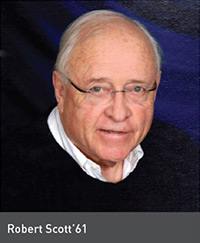 1961
1961
Robert Scott spent most of his career as a member of the Abbott Northwestern Hospital medical staff in Minneapolis. Having been chief-of-staff and a member of the Board of Trustees of Abbott Northwestern Hospital, he has firsthand knowledge of the changes that resulted in the evolution of two separate institutions—Abbott Hospital (named for Amos Wilson Abbott, who graduated from P&S in 1869) and Northwestern Hospital for Women and Children—that merged to become Abbott Northwestern. His new book on the history of Abbott Northwestern is described in this issue’s Alumni in Print.
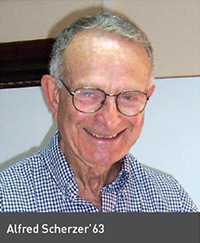 1963
1963
When Alfred Scherzer was first rejected from medical school after college, he turned to international work. Now, after five years of international public health work in Southeast Asia and the South Pacific with the U.S. Public Health Service and WHO and 50 years as a developmental pediatrician, Alfred retired in March 2016. His accomplishments include creating permanent organized government health education services in Burma and Ceylon. After becoming a physician, he established developmental pediatric services at Weill Cornell Medical College, where he is now clinical professor emeritus of pediatrics. Also during his career, he helped organize special education services for children with multiple disabilities in the New York City schools and developed international pediatric resident training in Cambodia. He has become a leader in global studies of early identification and intervention for children with disabilities. He has captured his journey in a memoir titled “Taking on Global Health Issues/Odyssey of a Developmental Pediatrician.” Read about the book in this issue’s Alumni in Print. “I invite my classmates to peek in and see where my travels have taken me,” Alfred says.
1965
Anthony H. Horan, who has a urology practice in California, writes: “Lest you think that the class of 1965 has gone to sleep, let me report my recent activities: In late October, I continued my record of unbroken (since 1994) submissions to the Western Section of the American Urological Association meeting in Hawaii, with four posters and a three-minute ‘useful trick’ presentation from the podium. Two of the posters were about enuresis. One described the overlooked diagnosis of spina bifida occulta as a cause of refractory enuresis in late childhood. A second described a cure of enuresis by dilatation of a ‘pin hole’ ureteral meatus in a large ureterocele over one month with a double-J ureteral stent.” In late January 2017, Tony presented a poster to the 27th International Prostate Cancer Update at Beaver Creek, Colo., that illustrated the slow attrition of radical prostatectomies (5 percent, 2013-2014) in the southern San Joaquin Valley after the USPTF decision about PSA. “New York general practice has done much better with a 35 percent reduction,” he adds.
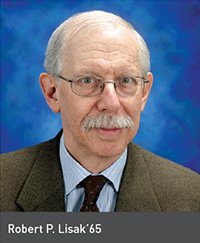 Robert P. Lisak serves as the Parker Webber Chair in Neurology at Wayne State University School of Medicine. He was editor of the Journal of the Neurological Sciences, the official journal of the World Federation of Neurology, from 1997 to 2013. He also has served as chair of the Department of Neurology and neurologist-in-chief at the Detroit Medical Center. At the University of Pennsylvania, he was vice chair of neurology and an associate member of the Neuroscience Institute. The second edition of “International Neurology,” a book he edited, is described in this issue’s Alumni in Print.
Robert P. Lisak serves as the Parker Webber Chair in Neurology at Wayne State University School of Medicine. He was editor of the Journal of the Neurological Sciences, the official journal of the World Federation of Neurology, from 1997 to 2013. He also has served as chair of the Department of Neurology and neurologist-in-chief at the Detroit Medical Center. At the University of Pennsylvania, he was vice chair of neurology and an associate member of the Neuroscience Institute. The second edition of “International Neurology,” a book he edited, is described in this issue’s Alumni in Print.
1974
Steven Schwarz received the Murray Davidson Award for 2016 from the American Academy of Pediatrics. He is professor of pediatrics at SUNY Downstate Medical Center and director of the Division of Gastroenterology, Hepatology and Nutrition at the Children’s Hospital at Downstate.
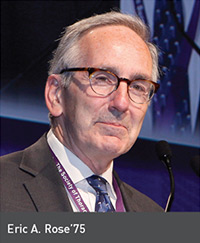 1975
1975
Eric A. Rose received the 2017 Earl Bakken Scientific Achievement Award from the Society of Thoracic Surgeons during the organization’s 53rd annual meeting. Eric is best known for performing Columbia's first successful pediatric heart transplant in 1984. He has continued to study and improve cardiac surgical care in children and adults. Much of his research has focused on the management of end-stage heart disease using artificial circulatory support. He serves as vice chair of the NIH-supported Cardiothoracic Surgical Trials Network and works with industry on discoveries related to smallpox, Alzheimer’s disease, and graft versus host disease. After more than 25 years at P&S, Eric joined Mount Sinai, where he chaired the Department of Population Health Science and Policy from 2008 through 2013 and where he remains a professor of population health science and policy. He also is executive chairman of SIGA Technologies, a biotech affiliate of MacAndrews & Forbes. The Earl Bakken Scientific Achievement Award, established in 1999, is named for the man who developed the first wearable artificial pacemaker.
1977
Harvey Makadon, director of the National LGBT Health Education Center and the National Center for Innovation in HIV Care, was chosen to receive an honorary degree from Rutgers University at its 251st commencement in May. Harvey, who also is director of education and training programs at the Fenway Institute and a professor of medicine at Harvard, was honored for devoting his career to providing and promoting care for the poor, the homeless, patients living with HIV, and members of the lesbian, gay, bisexual, transgender, and queer community.
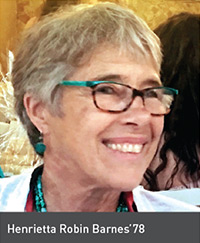 1978
1978
Henrietta Robin Barnes is an assistant professor of medicine at Harvard Medical School and has been practicing medicine for more than 30 years, including 27 years as a primary care internist at Cambridge Health Alliance. See Alumni in Print to read about her book, “Hijacked Brains: The Experience and Science of Chronic Addiction.”
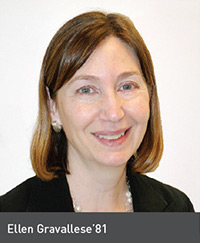 1981
1981
Ellen Gravallese has been appointed an associate editor of the New England Journal of Medicine. She also was named to the executive committee of the American College of Rheumatology as secretary, placing her in ascension to become president in 2019 after serving as secretary and president-elect. Ellen is the Myles J. McDonough Chair in Rheumatology, professor of medicine, and chief of rheumatology at the University of Massachusetts.
1983
After 27 years at the University of Maryland School of Medicine, Michael Donnenberg moved to the Virginia Commonwealth University School of Medicine in Richmond, Va., as senior associate dean for research and research training. In addition to overseeing the medical school’s research efforts, he will have oversight of the MD-PhD, PhD, and postbaccalaureate, premedical, and predental certificate programs. He continues his own research on the pathogenesis of enteric infections and plans to continue his practice in infectious diseases and teaching medical school students in preclinical and clinical settings.
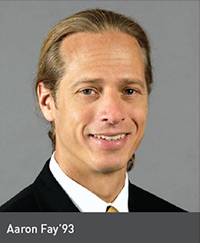 1993
1993
Aaron Fay has authored more than 100 articles and textbook chapters on eyelid and orbital surgery. He currently serves as an assistant professor of ophthalmology at Harvard Medical School and is a founding member of the Hemangioma and Vascular Malformations Clinic at Massachusetts General Hospital. A textbook Aaron edited is described in this issue’s Alumni in Print.
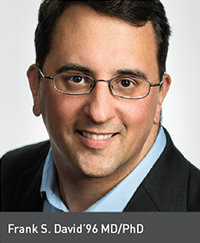 1996 MD/PhD
1996 MD/PhD
Frank S. David is founder and managing director of a biotech consulting firm, Pharmagellan. See Alumni in Print to read about his new book, a guide to biotech financial modeling. Before founding Pharmagellan in 2013, Frank was director of strategy in AstraZeneca’s oncology innovative medicines unit and, earlier, a director in the consulting arm of Leerink Partners. A board-certified pathologist, he also works as an innovation strategist at the Brigham Research Institute of Brigham and Women’s Hospital. He blogs about biomedical innovation at Forbes.com.
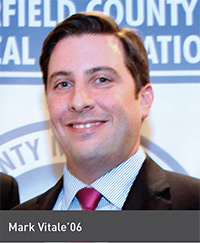 2006
2006
Mark A. Vitale received the Dr. Melville G. Magida Award at the Fairfield County Medical Association’s annual meeting in October 2016. The Magida Award has been presented annually since 1980 to a young practicing physician in Fairfield County, Conn., who exhibits a sense of genuine care and concern for patients. Mark is a board-certified orthopedic surgeon who specializes in the diagnosis and treatment of hand, wrist, and elbow conditions. He and his practice—Orthopaedic & Neurology Specialists in Greenwich and Stamford, Conn.—are affiliated with Greenwich Hospital. Letters of recommendation submitted on Mark’s behalf referenced his commitment to providing the highest quality of medical care for his patients and seeking optimal outcomes for them through surgical and nonsurgical techniques. Mark also has a master’s degree in public health from Columbia. After residency training at Columbia, he completed a fellowship in hand surgery at the Mayo Clinic in Rochester, Minn.
2009
Jacob M. Appel has another new book featured in this issue’s Alumni in Print, adding to his list of creations that includes literary novels, short story collections, stage plays, and essays. Many of his books and short stories have been honored with prominent book awards, and his plays have been performed in New York, Philadelphia, Tulsa, Detroit, Columbus, Indianapolis, Pittsburgh, New London, and other cities. An author, physician, attorney, and bioethicist, Jacob has degrees from Brown, Harvard, NYU, and Albany Medical College—in addition to his P&S MD degree. He is assistant professor of psychiatry at Mount Sinai School of Medicine and an attending physician at Mount Sinai Hospital and Beth Israel Hospital. He also teaches at the Gotham Writers’ Workshop.
2011
The Duluth Family Medicine Residency Program in Duluth, Minn., hired James Conniff as a faculty physician and board-certified family doctor. Jamie completed his residency in family medicine and community health and a fellowship in research at the University of Wisconsin in Madison. He also earned a master’s degree in public health from Wisconsin. Jamie joined the Duluth program after practicing at Northeast Family Medical Center in Madison.
- Log in to post comments

